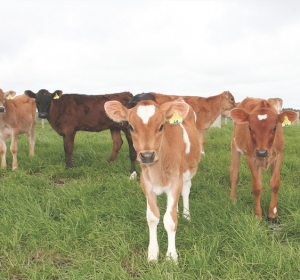Dr Roger Marchant, veterinary advisor to the NZ Veterinary Association’s Leptosure programme, says New Zealand needs to keep working to drop its ranking from the top of the OECD for having the highest rate of human leptospirosis infections.
Latest data shows New Zealand has 100 cases of the notifiable disease reported annually. However the disease is estimated to be under-reported by as much as 40 times and can be mistaken for a bad case of the flu if not diagnosed properly.
“If that ranking was not enough to give pause for concern, then the recent research on how critical it is to vaccinate livestock early against the disease should be,” says Marchant.
Traditionally calves have not been vaccinated until about six months of age. But a pilot study at Massey University in 2012 has highlighted the risk of calves becoming infected with leptospirosis prior to vaccination.
If they are already infected, any vaccine administered will be ineffective in protecting either the infected animal or those working around it.
“That study was a wake-up call. It showed that the age of vaccination appears to be critical to the vaccine being able to do its job and prevent infection.
“Extrapolating from the pilot study, a calf vaccinated at the traditional six month mark could be up to eight times more likely to be shedding lepto as an adult, compared to a calf vaccinated at 10 weeks of age.”
A good rule of thumb in vaccinating earlier is to plan on giving the first vaccine shot 70 days after the planned start of AB calving, and follow up with the second ‘booster’ vaccination four to six weeks later.
“You don’t want to start any sooner, or you run the risk that the protective antibodies from the mother will interfere with the vaccine’s effectiveness. Any later and they will have run out and the calf, if exposed to infection, is unprotected.”
Many calves are at risk of lepto infection from a young age as protection from colostrum is highly variable and short-lived in most calves. Delaying vaccination puts calves at risk of infection and long-term shedding. This can result in infected cows entering the milking herd.
Marchant says vets, farmers and farm staff face the greatest risk of contracting leptospirosis from ineffectively vaccinated young stock.
Hamilton employment law expert and lawyer Andrea Twaddle says farmers are not always aware of their responsibilities on leptospirosis.
“Under the Health and Safety in Employment Act, employers have a general duty to take ‘all practicable steps to ensure the safety of employees while at work’”, she said.
Bosses were required to identify and assess hazards, implementing controls or isolating those that might cause serious harm.
“It is practicable to vaccinate stock against leptospirosis, and therefore this should be considered by farmers on farms identified as at risk of the disease.”
Failing to take a basic step like vaccinating livestock for leptospirosis could give rise to employer liability for claims for health and safety breaches by a staff member, and the employer risks being pursued by Work Safe.
The new knowledge about needing to vaccinate early has been built into a revised leptospirosis ‘Leptosure’ best practice plan.
It emphasises the earlier vaccination times, covers the risk to other livestock, and offers advice specific to an individual farm’s risk situation.
Backing up the Leptosure programme are vaccines proven to prevent leptospirosis if administered prior to infection.
Zoetis market development manager and veterinarian Dr Wayne Clough says research has shown leptospirosis vaccines were effective in preventing leptospire shedding when administered prior to infection.









